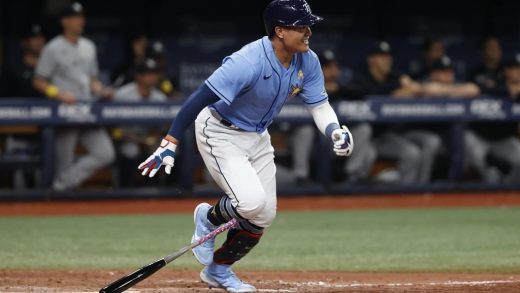
Growing up in Oshawa, Ont., professional hockey player Saroya Tinker was often the only Black player on the ice.
“I was always a little bit of an outsider in hockey in regards to the comments I would receive and experiencing racism in the game,” said the 24-year-old defender for the Toronto Six of the Premier Hockey Federation.
Tinker began skating when she was around four years old and began playing hockey at age six.

At 17, Tinker was accepted to Yale University and played hockey for the Ivy League school for four years.
“I really wanted to play professionally because I know that there’s not much representation out there for little Black girls that want to play hockey,” she said.
During her senior year at Yale, Tinker said she was struggling.
“I wanted to find another community,” she said.
Her mother discovered a group called the Black Girl Hockey Club.
Founded by Renee Hess, the California-based non-profit aims to inspire and sustain passion for the game within the Black community. Tinker began volunteering on the club’s scholarship committee and eventually raised $32,000 to start Black Girl Hockey Club Canada. The Canadian chapter launched in November 2022.
Like its American predecessor, Black Girl Hockey Club Canada offers a scholarship funded through Jumpstart, a financial aid program, community programs and mentorship opportunities for girls across the country. Tinker says there are also plans to make equipment available upon request and the group is finalizing a deal with the National Hockey League to be the donor.
The Calgary Flames have made financial donations to the club’s scholarship program, while the Vancouver Canucks are to host a meet-up with girls in March.
The club will also be launching a mental health and wellness program.
“We’re really just fostering a community, making sure the girls have what they need to succeed and friends to move forward in hockey, whether that’s them wanting to play professionally or just having fun with it,” said Tinker.
Tinker says Black girls deserve to be confident in who they are and know they have a place in the game.
“I felt like I always had to take a piece of my Blackness out to fit in,” said Tinker. “I think that my game has flourished most when I’ve decided to be unapologetic about who I am.
“That’s what we really aim to do, is have a piece of representation recognized and make sure that they can be unapologetic about who they are.”
Toronto Six coach Geraldine Heaney said Tinker brings a positive attitude to the rink.
“I think she’s the perfect person to be doing what she’s doing and getting young Black girls to have a safe space to play,” Heaney said.
Heaney began playing hockey when she was a child after her family immigrated to Canada from Ireland. Heaney said hockey for girls has changed since then.
“I felt like I wasn’t allowed and didn’t really have a place to play.”
Heaney played for the Toronto Aeros for 25 years. She won a silver medal playing for Canada at the 1998 Olympics in Nagano, Japan, and then a gold medal at the 2002 Games in Salt Lake City.
“Hockey is Canada’s national sport and everybody should have the chance to play it,” said Heaney.
Tinker was invited to play in the federation’s all-star weekend in January, where she said a lot of girls from the club showed up to support her.
The Toronto Six are in second place next to the Boston Pride.
“We’re looking forward to winning the Isobel Cup this year,” said Tinker, who’s gearing up to play against the Buffalo Beauts on Saturday in Toronto.
Heaney said that while women’s hockey has been growing over the years, it still needs support.
“I think people need to get out there and once they watch, they’re pretty impressed with the level of hockey that these women play right now,” said Heaney. “We play the game just as well.”
This report by The Canadian Press was first published Feb. 3, 2023
—
This story was produced with the financial assistance of the Meta and Canadian Press News Fellowship.


